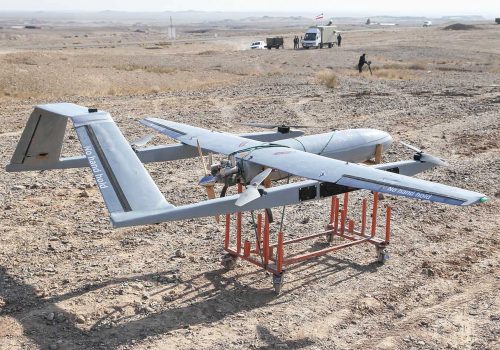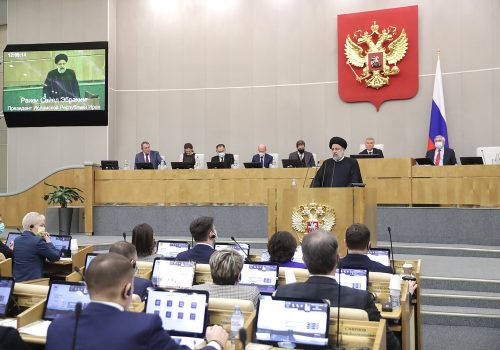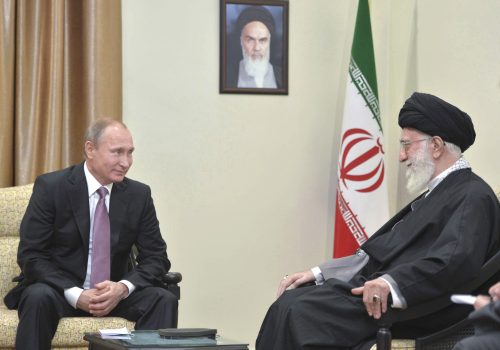Iran’s repression of dissent and help to Russia in Ukraine are deepening its isolation
For the first time since it seized US hostages after the 1979 revolution, Iran has alienated international public opinion in a way that could intensify its economic and diplomatic isolation.
The growing outcry against Iran’s brutal enforcement of the compulsory hijab—which led to the beating death of Mahsa Amini and at least two hundred more deaths in the repression of popular anti-government protests—has now been magnified by Iran’s tilt toward Russia and material support for its illegal invasion of Ukraine.
Regardless of the outcome of the current protests on the domestic Iranian political scene or the course of the Ukraine war, the consequences of Iran’s actions on issues ranging from the fate of the nuclear deal to regional policies may not be short-lived. From now on, international public opinion seems to be an added factor in future decisions on relations with Iran.
There has already been one such policy shift: the US government, which had staunchly supported revival of the 2015 Joint Comprehensive Plan of Action (JCPOA) despite apparent Iranian hesitation, has said that the deal is not a priority at present and that the US focus is on the protests in Iran. Secretary of State Tony Blinken has gone further and met with Iranian civil society activists. The US has also imposed new sanctions on Iranians linked to the repression and eased restrictions on Iranian access to tools to circumvent the Iranian government’s filtering of the Internet.
On top of this new negative scrutiny of Iran for its domestic abuses have come reports that Iran has supplied drones and technical experts to Russia to aid its brutal war on Ukraine. Although Iran’s foreign minister, Hossein Amir-Abdollahian and Iran’s High National Security Council have repeatedly denied the allegations, the US, Great Britain, and France are openly talking about the provision of drones as a violation of United Nations (UN) Security Council Resolution 2231, which codified the JCPOA. An arms embargo extended by the resolution expired in October 2020, but a provision barring exports or imports of missile-related technology remains in effect until 2023.
These accusations could trigger a snapback of all UN nuclear-related sanctions on Iran, with neither Russia nor China having the ability to veto them. Iran’s UN envoy, Saeed Iravani, has already sought to preempt such action by writing to the UN secretary general and asking him to “stop the misinterpretation of Resolution 2231 with the pretext of the Ukraine war.”
Ukraine, meanwhile, has threatened legal action against Iran. The Ukrainian foreign ministry said Iran is complicit in Russian terrorism, which “continues to carry out terrorist acts against the civilian population and critical infrastructure of Ukraine, using Iranian-made combat drones…Iran and its leadership will bear the strictest responsibility, including within the framework of international legal proceedings addressing Russia’s crimes against Ukraine.”
This threat is clearly a sign of what Iran should expect to come. Ukraine, at present, has no interest in continuing any political, diplomatic, trade, or industrial relations with Iran. These relations already decreased sharply after Iran shot down a Ukrainian passenger aircraft, killing all 176 onboard in 2020. Since the reports of Iranian drone sales to Russia, Ukraine has also started expelling Iranians studying in the country. It is a short step to completely severing relations.
Another important consequence that Iran must bear in mind is the possibility that Iranian financial assets and properties across the world (especially in Europe) could be frozen and even confiscated by Ukraine. Should Ukraine prevail in its war with Russia, it is likely to demand compensation from both Russia and Iran for war damages.
It is possible, of course, that Iran’s leadership will quietly ease up on its enforcement of the hijab and that the current crisis will pass.
Regarding Ukraine, however, Iranian people are right to question what their country stands to gain in exchange for intervening on Russia’s side. The decision is clearly above the authority of all Iranian civilian and military officials except for Supreme Leader Ayatollah Ali Khamenei. Despite what some parliamentarians in Iran have claimed, only Khamenei can embroil Iran in a war that has scant connection to Iran and, in fact, seems to be against Iranian national interests.
History may perhaps provide some context. Abbas Mirza was the crown price of Iran for Fath-Ali Shah, the second king of the Qajar dynasty, but died in 1833 before his father. This caused a succession problem that was resolved with Russian interference. Russia claimed that, according to the Treaty of Turkmenchay it signed with Iran a few years prior to Fath-Ali Shah’s death, Moscow guaranteed that the succession would remain with the children of Abbas Mirza. Is history repeating itself? One wonders whether Khamenei, who is eighty-three and ailing, has obtained a promise from Vladimir Putin that, in return for drones and Iranian military advisors for Ukraine, Russia will make sure that Mojtaba Khamenei succeeds his father when the time comes.
The author, who is well-versed in the Iranian political scene, was granted anonymity to share candid observations.
Further reading
Thu, Jun 2, 2022
How Russia’s invasion of Ukraine is shaping national security debates in Iran
IranSource By Sina Azodi
With the future of talks in limbo, the Ukraine war has brought the debates over the future of Iran’s national security strategy to the fore once again.
Mon, Mar 7, 2022
As the world shuns Russia over its invasion of Ukraine, Iran strengthens its ties with Moscow
IranSource By
Iran’s support for Russian actions reflects the improvement in bilateral ties, which have grown considerably at the political and military levels over the past decade.
Wed, Mar 30, 2022
Iran won’t break with Russia over Ukraine. Here’s why.
IranSource By
There are no signs that Tehran is walking away from its relationship with Moscow despite Russia’s actions toward Iran and its invasion of Ukraine.
Image: FILE PHOTO: An Iranian cleric stands near a drone during a military exercise in an undisclosed location in Iran, in this handout image obtained on August 24, 2022. Iranian Army/WANA (West Asia News Agency)/Handout via REUTERS


